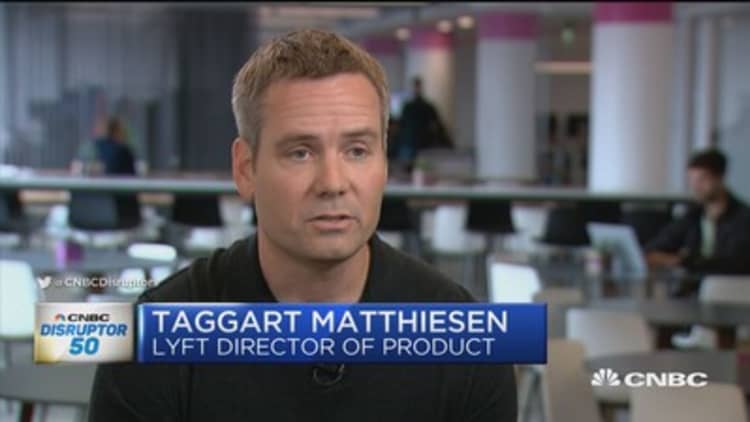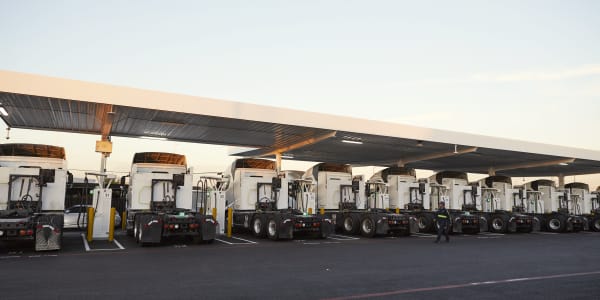"I've beaten them."
Those were the words Uber co-founder and CEO Travis Kalanick used to describe rideshare competitor Lyft — one of the most highly valued start-ups in the world — in a video that went viral earlier this year. But few have focused on that claim. It's worth reviewing, especially for investors. Uber is worth almost nine times as much as Lyft's $7.5 billion valuation, but it's far from ending the competition.
This year so far has not been kind to Uber. In the span of a few months, it has endured allegations of sexual harassment, a major legal challenge to its autonomous driving technology, revelations that Apple CEO Tim Cook threatened to kick Uber out of the Apple app ecosystem because of Uber programming designed to fool Apple's own engineers, and most recently a Department of Justice criminal investigation into its practice of "greyballing," or using software to elude government officials trying to stop the service in cities where it had not yet been approved.
An angry Kalanick caught on video yelling at an Uber driver, contended, "We have to [drop prices]. … We have competitors; otherwise we'd go out of business."
Kalanick is correct in this — its competitors, primarily Lyft, remain a threat to its $68 billion valuation. Lyft may be outgunned, but it's plenty crafty, and the war for rideshare supremacy is far from decided.
More from CNBC Disruptor 50:
Airbnb's $31 billion hotel disruption peaks. Next up: Flight bookings
Why Warren Buffett is betting on this software start-up
Snap out of it! This is 'the best of all IPO markets'
A CNBC analysis found three key ways in which Lyft has built itself into a formidable competitor to Uber in the United States. Lyft's development of proprietary technology, its high driver satisfaction ratings and its reported path to profitability helped push it ahead of Uber on the 2017 CNBC Disruptor 50 list. A year after Uber topped the list, Lyft now sits at No. 2, while Uber has dropped to No. 19.
And Lyft remains in a position to take significant market share from Uber in the year to come. As Uber faces internal strife, differences that seem small could loom large in the months ahead as both start-ups race to develop networks of autonomous vehicles, and passengers and drivers keep up the pressure for lower fares and higher earnings.
Just this week Lyft announced its plans to work with Waymo — formerly Google's self-driving car project which was spun out of Google and is part of parent company Alphabet — to bring autonomous vehicles to the masses. A Lyft representative told CNBC in a statement that the plan is to partner with Waymo to "safely and responsibly launch self-driving vehicle pilots."
The company added: "Waymo holds today's best self-driving technology, and collaborating with them will accelerate our shared vision of improving lives with the world's best transportation."
Uber's nearsighted patent protection
Technology is one area where Lyft has an edge over Uber, in part because of the type of patents both companies claim. Lyft has a relatively small number of patents, but they're superior, according to a CNBC analysis conducted by MCAM International. Lyft's patents are more focused, specifically on the development of an improved rider experience. Uber's portfolio is more vast but less likely to bring the company a specific advantage, covering everything from search and mapping to autonomous driving, found MCAM, which analyzed the patent quality of all 838 Disruptor nominees for 2017.

"Uber has many more patents than Lyft, but they are, in my opinion, more protectionary than visionary," says Dex Wheeler of MCAM International. Uber has acquired a large portfolio of patents so it can attempt to defend itself against potential infringement lawsuits. But Wheeler described these patents as "only OK."
In a legal bruise, a federal judge just ruled that criminal intellectual theft allegations made by Waymo against Uber should be forwarded to the U.S. Attorney's office for investigation. And that Uber engineer Anthony Levandowski, poached from Waymo, must be removed from any work relating to a key technology called LIDAR, which helps cars "see."
U.S. District Judge William Alsup stated in court documents revealed Monday, "The evidence indicates that, during the acquisition, Uber likely knew or at least should have known that Levandowski had taken and retained possession of Waymo's confidential files. Waymo has also sufficiently shown ... that the 14,000-plus purloined files likely contain at least some trade secrets."
Uber wanted the case kept in private arbitration.
The not-so-long-term goal for Uber and Lyft is to build a network of vehicles that operates without drivers. Both Lyft and Uber have made ambitious claims about when this might happen, but the two companies differ in their approach to developing the technology. "Uber has made acquisitions in the space to help them along," Wheeler said, but he added, "I still think Lyft is looking at a faster route to self-driving." Wheeler is referring here to the 2016 acquisitions of Otto and Tyto Lidar LLC.
Lyft also has been developing its autonomous drive in partnership with General Motors, which took a 9 percent stake in the start-up in 2015. GM said in its 2016 annual report, "We plan to develop an integrated network of on-demand autonomous vehicles in the U.S."
GM does also have a partnership with Uber, inked last year, that allows Uber drivers to rent GM vehicles (and Uber has a similar deal with Toyota, which made a strategic investment in Uber in 2016).
Drivers prefer Lyft, but there's a hitch
One challenge both companies face until self-driving cars dominate the roads is that drivers work for both. And those drivers generally prefer Lyft. And Uber's PR nightmare isn't helping.
A January survey of rideshare drivers conducted by The Rideshare Guy, a blog and podcast that reaches tens of thousands of drivers a week, found 75.8 percent of Lyft drivers said they were satisfied with their experience driving for Lyft. Less than half (49.4 percent) were satisfied with Uber. Harry Campbell, who founded The Rideshare Guy in 2014, says, with these numbers in mind, that he wasn't surprised by Travis Kalanick's behavior in the viral video.
"Drivers have long understood this is what the relationship with Uber is like," Campbell said.
Despite that, 75 percent of the 1,150 self-selecting respondents to Campbell's survey said they drove primarily for Uber, versus only 20 percent who primarily drive for Lyft. Sixty-seven percent said they were active drivers with more than one service. "There's not a lot of loyalty on either side" Campbell said. "Drivers go where the passengers are, and passengers love Uber."
Uber did not respond to multiple requests for comment.
Lyft's done a great job of creating a driver-friendly culture. ... it's been hard for them to distinguish themselves on the passenger side.Harry Campbellfounder of The Rideshare Guy
A Lyft spokesperson told CNBC it has seen a more than 60 percent increase in passenger activations week-over-week after the #deleteUber hashtag began trending in January. Anecdotally, Campbell says drivers do feel like there's been an uptick in Lyft demand, but there hasn't been a noticeable drop in Uber rides. "It's slow but steady progress," he said. "What we hear from a lot of Lyft passengers is that they used to only ride with Uber, but they had some type of bad experience."
Hence Lyft's focus on offering a better experience for passengers by improving technology in the car and on its app. The company is all but certain that if it can lure more passengers away from Uber, the drivers will follow. "Lyft's done a great job of creating a driver-friendly culture," Campbell said, but added, "it's been hard for them to distinguish themselves on the passenger side."
Lyft's tipping point
It's the golden age of rideshare because of the abundance of passenger incentives available for Lyft and especially Uber customers, Campbell said.
Uber is sitting on a mountain of cash, and Uber distributes some of that to drivers in the form of incentives for hitting certain goals and keeping the app open longer. It also regularly doles out discounts to passengers. As is the case with many commodity products or services, consumers tend to gravitate toward the lowest price when it comes to choosing a ride.
In the fourth quarter of 2016, passengers spent $6.9 billion on Uber rides (what Uber calls "gross bookings"), according to financial information it shared with Bloomberg News last month. It netted $2.9 billion in revenue and a loss of $991 million. Uber more than doubled its bookings, but it burned through a historic amount of cash to do it.
Lyft says it tripled its booking from 2015 to 2016. Last year Lyft handled more than 160 million rides — triple the number in 2015 — and recently completed a new, $600 million round of funding from investors such as Alliance Bernstein, KKR, Japanese retailer Rakuten and Canada's Public Sector Pension Investment Board. Of course, it's also not generating a profit, but CNBC reported in January that it could reach profitability before Uber does. The implication is that Lyft has more wiggle room to offer deals down the line, which could give it a big advantage when and if Uber is forced to raise fares and reduce incentives.

Lyft also allows passengers to tip drivers through the app and says drivers have earned $200 million to date in tips. That's $200 million less that Lyft has to offer as incentives to drivers. It has also launched a Round Up and Donate program, allowing passengers to round up their fare to the nearest dollar and donate the difference to charity. It may also prove that some passengers are willing to pay a little more for good service, something Lyft is betting on as it works to improve the passenger experience. It's a big bet.
To get into the CNBC Disruptor 50, companies had to score in the top 10 percent in multiple categories in an initial nominee pool of 838 companies. As a result, differences between Lyft at No. 2 and Uber at No. 19 turn out to be relatively small — and less significant than the ranking may superficially suggest.
But the war between the two — and others including Asian competitors like Grab — isn't anywhere near over. As of now, Kalanick's web of deceptions includes the brash assessment that he's "beaten" Lyft. It's a false statement.






